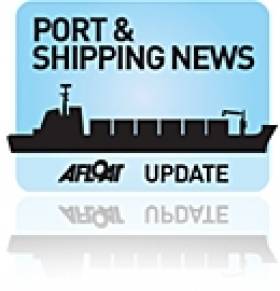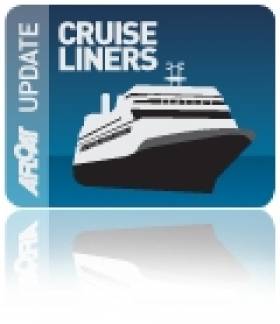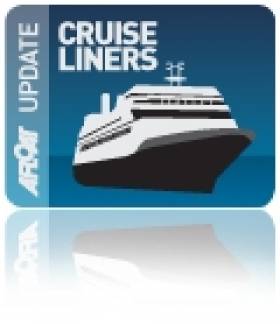Displaying items by tag: London Olympic Cruiseship charter
Ports & Shipping Review: Port Trade Rise,Silver-Salvage, Ports Study, Ferries, 'Olympic' Cruiseships and New Ship
#PORTS & SHIPPING REVIEW - Over the last fortnight Jehan Ashmore has reported from the Ports & Shipping Scene which saw trade volumes in Drogheda Port continue to rise. An increase of over 44% was recorded for the first six months of 2012 compared to the same period last year.
Off the west coast, a record breaking 48 tonnes of silver bullion has been recovered from the wreck of S.S. Gairsoppa, a 412-ft British cargoship that was torpedoed by U-Boat in WWII.
The Competition Authority is to conduct an in depth review of how our ports perform and how they are to be funded and to examine whether Dublin Port has an economically dominant position.
A boost on all fronts for traffic figures on Stena Line's Belfast-Birkenhead (Liverpool) route was welcomed by the ferry operator which completed the takeover of operations from DFDS Seaways last summer.
Single-route operator Celtic Link Ferries reached an agreement with Rosslare Europort, to end a stalemate in over €100,000 relating to unpaid port landing fees.
Deutschland, one of the three cruiseships that visited Dublin Port last weekend completed its cruise in London, where the vessel is currently moored as a floating hotel for the German Olympic Sports Federation.
Belfast M.P. Nigel Dodds is leading a campaign to keep the WWI battleship cruiser HMS Caroline, the last survivor of the Battle of Jutland, from leaving the city. The 1914 built ship could be moved to Portsmouth for preservation or even face scrapping.
At the other end of the island, Cork based Irish Mainport Holdings has acquired a new seismic-support ship. The vessel renamed Mainport Kells has recently taken up a long-term charter contract for clients operating in the North Sea.
Chartered Cruiseships Gather for Olympic Games
#OLYMPIC CRUISESHIPS - Peter Deilmann's cruiseship Deutschland (1998/22,496grt) which called to Dublin Port at the weekend is en-route in the English Channel, having departed Plymouth bound for London, where she is set to became a floating hotel during the Olympic Games, writes Jehan Ashmore.
With less than four days to go to the start of the games, the 480 passenger capacity cruiseship has been chartered by the German Olympic Sports Federation. The vessel is scheduled to dock in West India Docks at the foot of the towering banking HQ offices in Canary Wharf.
Last year she made a trial visit, where she became the largest ever vessel to enter through the West India Dock lock. So with her return, she joins Fred Olsen Cruise Lines 929 passenger Braemar (1993/24,344grt) which as previously reported on afloat.ie is also on charter during the sporting spectacle, to the London Organization Committee of the Olympic and Paralympic Games (LOCOG).
The Bahamas-flagged vessel, formerly launched as Crown Dynasty for Crown Cruise Line, is moored in the East London Dock's Albert Dock basin at a berth facing opposite to the runway of London City Airport.
Astern of this vessel is Gemini (1992/19,093grt) which by coincidence is her sistership, having served as Crown Jewel, as both cruiseships were ordered by Crown Cruise Line from the Spanish shipyard of Union Naval de Levante in Valencia. However since change of ownerships, the Braemar was lengthened for her current operator.
As for Gemini likewise, she too has been chartered to LOCOG to accommodate personnel over the course of the games.
Tomorrow Noble Caledonia's 114-passenger Caledonian Sky is due in London too, the former Hebridean Spirit (1992/4,200grt) made a once-only cruise/promo call to Dun Laoghaire Harbour around a decade ago. The large yacht-like vessel will be accompanied by other 'private' luxury motor-yachts during the games, which were last held in the British capital in 1948.
Olympic Bound Cruiseship On Overnight Dublin Call
#OLYMPIC CRUISESHIP – A cruiseship which is to be used as accommodation ship for key workers during the London Olympic Games is currently on a UK mini-cruise including today's overnight call to Dublin Port, writes Jehan Ashmore.
The cruiseship Braemar (1993/24,344grt) has been chartered by the organisers of the global sporting event for over a month. Around 900 personnel are to use the 195 metre-long vessel as their 'floating' accommodation during the games which is run by the London Olympics and Paralympic Games (LOCOG). Most of the workers will be involved in transportation duties for competitors and officials from 12 July – 15 August.
The vessel is to berth in East London Dock (Albert Dock or King George V) which is close to the ExCel Centre, the exhibition venue which has hosted London Boat Show's over the years, will be used for a number of Olympic events. In addition the location is close to the main transport hub for the Olympic workers and is also nearby to London City Airport.
As a consequence of the cruiseship's 34-day long charter, three cruises have been cancelled by the vessels owner Fred Olsen Cruise Lines.
Guests who were originally booked on the affected cruises on board the Braemar have been offered alternative itineraries. In addition the company provided a goodwill gesture to acknowledge the inconvenience while those passengers who choose not to take up this offer have been given a full refund.
Last month the same owners organised a special Titanic Memorial Cruise which called to Cobh, having completed a mini-cruise to Belfast to mark the historical centenary of the liner's construction at Harland & Wolff Shipyard.
































































